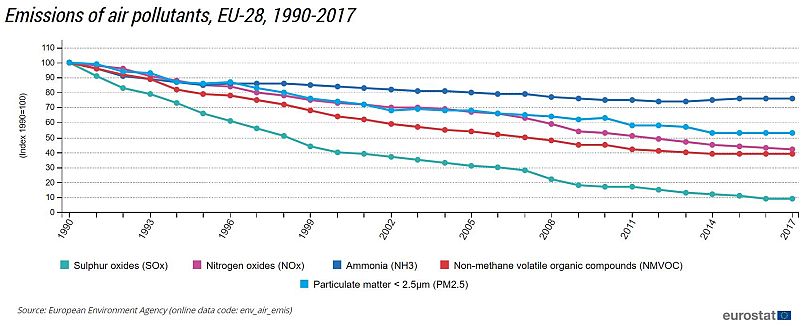EU's air pollutant emissions decreased 'significantly' in past 28 years: report
The European Union's (EU) emissions of five main air pollutants, which "harm human health and the environment," decreased significantly between 1990 and 2017, according to a new Eurostat report.
This reduction was "thanks to a wide range of environmental policy measures," it added.
The study said it considered emission inventories for the most important air pollutants in the EU, including sulphur oxides (SOx), nitrogen oxides (NOx), ammonia (NH3), non-methane volatile organic compounds (NMVOC) and fine particulate matter (PM2.5).
However, it did not take into account greenhouse gas emissions, including carbon dioxide (CO2), which were examined in a separate report.
Carbon monoxide was not included either because its environmental impact is less important than other air pollutants, a Eurostat spokesperson told Euronews.
"Nitrogen dioxide and particulate matter pollution pose serious health risks, while Europe's sensitive ecosystem areas are affected by acid deposition of excess sulphur and nitrogen compounds (SOx, NOx, NH3)," the report warned.
These pollutants are all emitted from human activities, mainly the combustion of fuels.
Road transport is one of Europe’s main sources of air pollution, especially of harmful pollutants such as nitrogen dioxide and particulate matter, according to the "Air quality in Europe — 2018 report" by the EU's independent organisation the European Environment Agency (EEA).
Exposure to outdoor air pollution causes 4.2 million deaths every year, according to the World Health Organization.
The biggest reduction was reported for sulphur oxides (SOx) with a decrease of -90% — emissions of SOx in 2017 stood at 2.3 million tonnes compared to 25 million tonnes in 1990.
Sulphur dioxide (SO2), is produced by volcanoes and in various industrial processes, for example, coal and petroleum often contain sulphur compounds, and their combustion generates sulphur dioxide.
Reductions in SOx emissions in the energy production and distribution sector (15.3 million tonnes) made the biggest impact on this figure, according to the report.
Non-methane volatile organic compounds (NMVOC) and nitrous oxides (NOx) saw the second-biggest decrease, both at 60%.
Nitrogen oxides, particularly nitrogen dioxide, can be seen as a brown haze or plume downwind of cities and are expelled from high-temperature combustion and are also produced during thunderstorms by electric discharge.
A major reduction in NMVOC took place in the road transport sector (5 million tonnes) and in industrial processes and product use (2.9 million tonnes), the study found.
The road transport sector achieved the largest decrease in NOx emissions (4.6 million tonnes), but it is also the largest contributor of the pollutant in the EU.
Emissions of fine particulate matter (PM2.5) have been almost halved since the year 1990, the report said.
Ammonia (NH3) emissions showed the smallest decrease, falling by roughly one quarter.
The EEA agreed "emissions of many air pollutants have decreased substantially over the past decades, resulting in improved air quality across the region."
However, it added that "air pollutant concentrations are still too high, and air quality problems persist".
"A significant proportion of Europe’s population live in areas, especially cities, where exceedances of air quality standards occur: ozone, nitrogen dioxide and particulate matter (PM) pollution pose serious health risk," it said.
Adding that while the overall picture was good, several countries exceeded one or more of their 2010 emission limits for four important air pollutants.
"Reducing air pollution, therefore, remains important," it said. "Air pollutants released in one country may be transported in the atmosphere, contributing to or resulting in poor air quality elsewhere."
For the European Environmental Bureau (EEB), there's still a long way to go in reducing air pollution.
“Pollutants in the air we breathe are still responsible for more than 400,000 premature deaths per year in the EU. National governments need to do more and to do it faster. We need stricter rules and more controls on big emitters and big polluting sectors, like agriculture, because there is no such thing as a safe level of air pollution," said Margherita Tolotto, Policy Officer for Air and Noise at the EEB.












